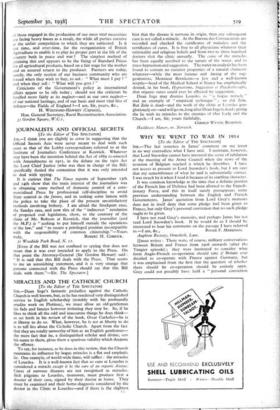MIRACLES AND THE CATHOLIC CHURCH [To the Editor of THE
SPECTATOR] Sta,—Dean Inge's fantastic prejudice against the Catholic Church is well known, but, as he has rendered very distinguished service to English scholarship (notably with his profoundly erudite work on Plotinus), we must allow an old gentleman his fads and fancies however irritating they may be. So, if he likes to think all the odd and inaccurate things he does think— as set forth in his review of the book, Great Catholics—he is at liberty to do so. What, however, he is not at liberty to do is to tell lies about the Catholic Church. Apart from the fact that they are totally unworthy of him as an English gentleman— the mere fact that he, a distinguished scholar and divine, sets his name to them, gives them a spurious validity which deepens
the offence. •
To say, for instance, as he does in this review, that the Church maintains its,influence by bogus miracles is a flat and emphatic lie. One example, of world-wide fame, will suffice : the miracles of Lourdes. It is a well-known fact that no cure at Lourdes is considered a miracle except it be the cure of an organic disease. Cures of nervous diseases are not recognised as miracles. Sick pilgrims to Lourdes, moreover, must produce first a dossier of their case, signed by their doctor at home. They must be examined and their home-diagnosis considered by the doctor in the Clinic at Lourdes—and if there is the slightest
hint that the disease is nervous in origin, then any subsequent cure is not called a miracle. At the Bureau des Constatations are recorded and checked the certificates of maladies and the certificates of cures. It is free to all physicians whatever their nationality and religious beliefs and from two to three hundred doctors visit the clinic annually. The cause of the miracles has been equally ascribed to the nature of the water, and to mass-hypnotism and suggestion. The water on analysis has been found to contain no curative properties of a natural character whatever—while the most famous and daring of the sug- gestionists, Monsieur Bernheirn—a Jew and a well-known sceptic—head of the Medical School at Nancy has emphatically denied, in his book, Hypnotisme, Suggestion et Psychotherapie, that organic cures could ever be effected by suggestion.
Dean Inge may dismiss Lourdes as " a bogus miracle " and an example of " empirical technique " ; so did Zola. But Zola is dead—and the work of the clinic at Lourdes goes gloriously on—end will go on, long after Dean Inge is dead ; giving the lie with its miracles to the enemies of Our Lady and the Church.—I am, Sir, yours faithfully,














































 Previous page
Previous page